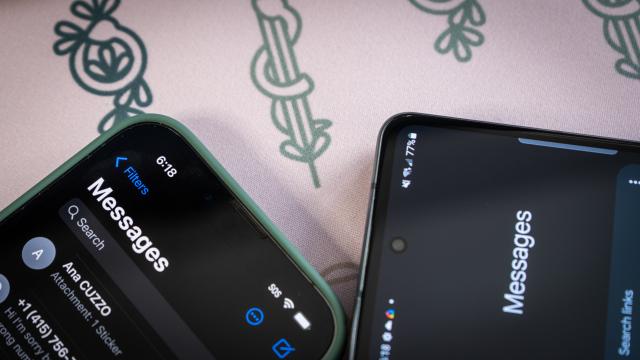This week, alongside a massive unveiling of brand new foldable devices and accessories from Samsung, Google put out its own ad campaign in an attempt to rally the troops against Apple’s tyrannical reign on messaging. Google’s #getthemessage campaign hopes to stoke the flames of millions of bothered Android fans so that Apple might be encouraged to support RCS messaging, the cross-platform standard recently adopted by Google Messages.
The Get The Message website reads like a Bible class handout from my old Christian school. It has all the talking points Google wants me to use to remind people that it’s Apple’s fault that I, as an Android user, don’t have access to the full resolution and capabilities afforded by Apple Messages. Google brings up that, sometimes, group messages get broken because they include a mixture of Apple and Android-using folks, often leading to “social frustration.” It even links to past coverage pointing to evidence that children and teens dread carrying around Android devices for fear of being denoted an uncool Green Bubble.
I immediately knew what Google was going for when I saw the ad campaign go live. I remember covering Google Senior Vice President Hiroshi Lockheimer’s first tweet storm about the inefficacies of Apple’s proprietary messaging standard. And then the second time, months after when he called on Apple to make it easier on everyone.
But the latest #getthemessage campaign seems a little all over the place. I’m struggling to understand precisely the demographic that is supposed to go after Apple to make things play nice. Is it Android olds like me who are crotchety and have complained about the lack of parity in messaging since the early days on the platform? Or is it Gen Z-ers on TikTok who have no problem taking in the weirdest Riverdale storylines and running with whatever horror shitshow the CW is allowing to show over there? (I hear it’s very good.)
Why is Madelaine Petsch, who plays Cheryl on Riverdale, part of this ad campaign? Is she supposed to inspire the youngins to help drive the point home? Furthermore, why is Vanessa Hudgens part of this ad campaign, when her last relevant IMDB entry is The Princess Switch, a Netflix-exclusive Christmas movie with nothing on my Lifetime favourites? I have absolutely no emotional connection to these people as an Android user. Not to mention, you can tell they’re reading off a script from their screens. I don’t believe these famous-ish people know what my life is like wielding an Android phone and hanging out in Apple land.
What’s the problem with iMessage?
There’s indeed fragmentation in text messaging among the major mobile platforms. Apple Messages app runs on the iMessage service to send texts between iPhones and other iOS-enabled devices. It supports end-to-end encryption, better support for group chats, and high-resolution images and videos. But when an Apple user texts an Android device with the default texting application, the message is sent out as an old-school SMS or MMS message, often deprecating the experience of the text on the Android user’s side.
Google adopted RCS, or Rich Communication Services, to try to fix this dichotomy, and it’s already in use in other markets. RCS enables encrypted messaging, high-quality media sharing, and other modern features like bigger character limits and read receipts. If you have access to RCS on Android Messages and are chatting with another Android user, you already have access to some of these features. That’s what life could be like with your iPhone-using pal.
Google has attempted to bridge the gap between iOS and Android messengers despite the repeated pleas for Apple to do the work. Emoji reactions, which used to be limited to iPhone users, became available earlier this year after the company added support for them on Android.
The fragmentation will persist unless Apple wants to get on board with RCS. But Apple is committed to keeping its walled garden coifed and gated up, because it helps sell its hardware, where it makes the bulk of its cash. The iOS 16 Beta already has iPhone-only abilities to edit and delete delivered iMessages. That sort of feature is possible precisely because of the tightly-knit nature of the iOS platform.
Anyway, I wouldn’t be surprised if this campaign fizzles out because Android users have already moved on. Meta’s Messenger and WhatsApp have a stronger hold on the market, and many other messaging apps work with your phone number. Even I’ve moved on from Android Messages and find most of my daily correspondence happening exclusively inside Instagram DMs.
